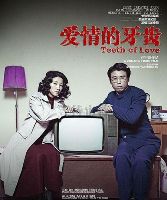If you need convincing that Yan Bingyan is a deserved winner of the Best Actress award at this year's Golden Rooster Awards - known as China's Oscars - consider this: the 30-year-old actress spent 10 years in small TV roles before landing her first movie part in The Teeth of Love.
Born in Beijing, Yan, a dance graduate, wallowed in obscurity for a decade before being discovered.
"I understand how surprised people felt when my name was announced that night. I can't believe it either. Before that night hardly anyone knew who I was even though I have been playing various roles since 1994," she says.
The Teeth of Love
took its writer-director Zhuang Yuxin 10 years to complete. By the time it came to casting, Yan's natural Beijing dialect and rebellious eyes caught the filmmaker's attention. He knew straight away that she was right for the film.
Opening and ending with scenes on a dentist's chair, The Teeth of Love tells the story of a woman's emotional pain from three failed love affairs. Split into three parts, the film follows Qian Yehong firstly through her tomboy teenage years in 1970s Beijing, during which she breaks the heart of an adoring boyfriend.
The drama then shifts to her early 20s, with her working as a doctor in a hospital. She has an affair with a married man. After this ends badly, she returns to Beijing to work in an abattoir and drifts into a marriage with a shy man called Wei Yingqiu, the relative of an old classmate. Sadly, although the couple has a child, Qian remains unfulfilled.
Each affair somehow manifests itself physically with the troubled protagonist, such as back pain in her teenage years and an abortion from her time with the married man.
Qian's weak back serves as a symbol of her misery and flare-ups serve as a warning of imminent trouble.
"During her 10 years, Qian seems calm but is still restless inside. She understands in the end that pain is the shortcut to love," Yan says.
Spanning 1977-87, the film parallels Qian's struggles with China's profound social transformations. Zhuang directs with a naturalistic, unobtrusive style, utilizing a palette of muted colors which heighten the gloomy atmosphere. The film's tension is further accentuated by the sinister soundtrack.
"I found that pain and love are closely related to and rely on each other," says Zhuang who believes that contemporary romance lacks the pain necessary to engender deep emotions.
"In the end, people really do not respect the experience of being in love," he says.
Unlike other films that use the reform era to explore the effects of change upon the individual, Zhuang sidesteps social commentary to deliver a touching, albeit sometimes cruel, tale. Instead of tackling the changing times, he focuses on the complex interactions between pain, love, memory and the human experience.
As an admirer of Ingmar Bergman, Zhuang pays tribute to the late Swedish director with his use of middle distance and close-up shots.
According to He Jiawei, executive director of marketing at Phoenix International Production company (which produced The Teeth of Love), the film's 3 million yuan (US$400,000) budget is small compared to other domestic films.
"But during its one-month shoot, the crew members cooperated well and when the film was shown at cinemas it was applauded by audiences," He says.
The response from critics has been warm too, with the film being well received at the recent Asian Festival of 1st Films at Singapore. The Teeth of Love was also shown at the 2007 Deauville Asian Film Festival in France and won the Best Feature award at the 14th Beijing Student Film Festival. The film was also invited to screen at the 31st Montreal World Film Festival, which started on August 24, the day of its public release.
(China Daily December 26, 2007)




